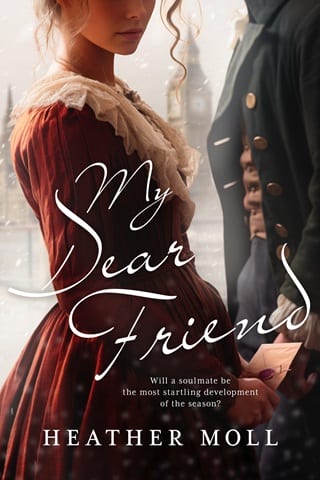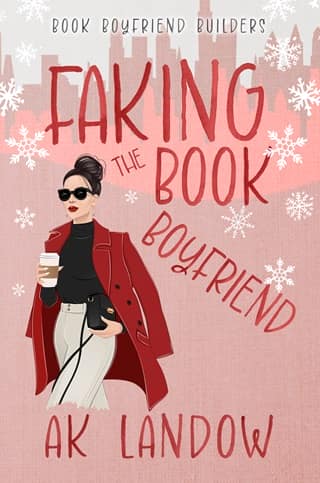Chapter 5
Chapter Five
E lizabeth read F's most recent letter in the drawing room while her aunt and sister talked by the fireplace. She had replied to him yesterday afternoon and would receive a reply tomorrow morning, or possibly even tonight. He was a reliable correspondent, and yet she was impatient to hear from him.
Her new friend seemed not quite solitary, but not one to enjoy a crowded room, either. He was not shy, but would probably prefer a quiet evening with a few friends rather than a lively party with strangers. For herself, she saw the value in both. She wanted to engage with the world and could mix with strangers, but she needed moments alone for introspection and to regain her spirits to be sociable once again. For all her friendliness, there were few people she truly loved, and F appeared to be the same.
F seemed like he would be a candid man when he spoke, and not likely to flatter or flirt. It was no wonder his cousin thought this correspondence was a better means for him to get acquainted with a woman and a stranger. A lady always liked to be admired a little, but perhaps F was not inclined to do that until he was certain of a lady's regard.
Of course, flirting would help improve that regard.
Did she want to flirt with F?
Elizabeth huffed to herself as she put down his letter. She did not want to flirt with her new friend. It was just a shame that women could not be forward in showing their feelings. Men could say all manner of pretty and forward things that were still within the bounds of propriety, but if she hinted at her fondness for a man, her reputation suffered for it. Thank goodness for opportunities like this matchmaking subscription to allow women some margin to act a little more like men were allowed to.
Not that she had any interest in flirting with F.
She was, however, eager to know everything about him. In fact, she thought of him all the time, wondering what his opinion would be on some matter or what he might be doing at that moment. He had even grown a little more sporting throughout their exchanges. She doubted he would ever be truly lively, but he had seemed to relax enough to enjoy her teasing him and his replies had grown conversational and less severe. What would he be like in person? Would he listen as well as she hoped he would?
"Lizzy, does your letter writer have a name?" Mrs Gardiner asked her.
Elizabeth started. "Only an initial," she called, hoping they had not caught her with her mind wandering to F. "There is anonymity until we decide to meet, and we have both declared that neither of us is in a hurry."
"That is wise," her aunt said with approval in her eyes. "The right man will come along at last—and he might not be this correspondent. So, what letter does your new friend's name begin with?"
"F. Perhaps he is a Francis, or a Frederick."
"He might go by Frank, or Fred," Jane said.
"Maybe his family calls him Freddy?" Elizabeth said, smiling. "We could be Lizzy and Freddy at family gatherings."
"What if his name is actually Felix?" Mrs Gardiner teased, and they all laughed.
"Oh, a Felix I could not countenance," she cried. "He must have a steady and dull name for me to approve of him."
There was a noise in the hall that indicated they were to have visitors, and Elizabeth hastily put away her letter from F. People rarely approved of the subscription agency in public, and she had no wish for anyone to know she was engaged in the business.
Bingley, his sisters, and—to her utmost surprise—Mr Darcy were shown into the drawing room. Elizabeth and her aunt's gazes could not help but turn to Jane, who looked ill at ease and wore a pained expression.
"Good morning, ladies," said Bingley cheerfully. "I am sorry we could not call before today. I wanted to, except my sisters have been engaged all week. But they were finally free today. They have been so eager to call, and I insisted on joining them."
A quick look at his sisters' faces told Elizabeth that it was the other way around. Bingley was determined to renew the acquaintance despite his sisters' displeasure. Why Mr Darcy came, however, was harder to tell. Perhaps he had a penance to pay, too. He greeted everyone and then sat on Elizabeth's side of the room without another word. She suspected had there been a newspaper within reach, he would have taken it up and ignored them all.
That made her more eager to provoke the reserved, proud man into speaking.
"And what brings you to Cheapside today, Mr Darcy?" she asked him directly.
He paused before answering. "Bingley resides with me while in town, and when he said he was paying a call, I thought it proper to join him since I saw all of you at the panorama. Had you a pleasant time?"
She answered succinctly that she did. It had been extraordinary, but she was not about to waste her time extolling its fine qualities to him. She would save her sentiments for F, a man far more likely to share her opinion than Mr Darcy.
Even from across the room, Elizabeth could see that Jane was troubled as Bingley chatted with her and their aunt. Jane knew how little her former friends approved of her acquaintance with their brother, and she probably was uncertain what to make of Bingley's intentions. Was he merely being amiable, or did he love Jane?
"I did not know you to be in town also, Miss Eliza," Miss Bingley eventually said when she had passed too much time in silence.
"I suppose your conversations with Jane here and in Grosvenor Street were so short, and you hurried away so quickly that she did not have the time to mention it. You must be busy with your other friends."
Elizabeth smiled, but Miss Bingley did not return it and looked away. Bingley, she noticed, looked embarrassed.
The talk, as it always seemed to lately, turned to the new and astonishing subscription matchmaking business. Her aunt looked at Elizabeth, who subtly shook her head. While she felt no shame in her letter writing, there was no reason to open herself to the criticism of Bingley's sisters and Mr Darcy.
"I see nothing wrong with it, in theory," Bingley said. "However, I would prefer to pay notice to a lady already acquainted with me. How could one get to know a lady without ever having the pleasure of hearing her voice?" His eyes strayed to Jane, and a smile crossed his lips. Elizabeth watched her sister blush and look away.
The silence that followed stretched until Mr Darcy said, "Do you think that a respectable man could take unto himself a wife through such a medium?"
Elizabeth was not sure if he was speaking to her, since she sat nearest to him, or if it was a question posed to the entire room, but it was Miss Bingley who answered. "Oh no! And no woman of refinement, or who has the self-respect she ought to have, would begin a correspondence with a stranger."
Elizabeth felt she ought to be looked at, and her aunt and sister avoided looking at her.
"And," added Mrs Hurst, "we should chasten these men for putting their desires into print."
"But matches are made by meddling friends or a desperate mother," Elizabeth said. "I think this gives the subscriber more choice."
"Yes, and it is no worse than a woman wearing cosmetics and dancing with an eligible man," said Mr Darcy, "or a man who puts an advertisement in the second column of the front page of The Times ."
His agreement surprised her, and she looked at him for a long moment. The idea of Mr Darcy subscribing to find a spouse amused her. He was so haughty and proud he would probably expect his correspondent to accept his proposal after one letter, if he even found a woman he could deign to write. No, Mr Darcy would never subscribe. He might be more progressive than she imagined, but he was still a man who thought meanly of those outside his circle.
"It is more respectable than that," Elizabeth finally said. "Besides, what if one has exhausted all other means that are usually employed to find a spouse? Are they then to remain single for the rest of their life?"
"Well, it may be a viable option," said Miss Bingley firmly before Mr Darcy could answer, "but not a respectable one. My dear Jane," she said loudly, "are you in town for the rest of the season? You must have told me, but I quite forgot."
Jane answered she was to stay until May, and then Bingley questioned her about all the things she might like to do while in town.
As she watched Jane and Bingley talk, her with blushes and him with great animation, Elizabeth hoped they might reconcile. She then turned to see how Mr Darcy thought of their talking together. He seemed to look at their conversation with noble indifference, and she longed to know what his real opinion was.
As they rose to part and to put on hats and gloves, since they were still a little apart on the far side of the room, Elizabeth asked him quietly, "What think you on the matter of our mutual friends?"
"Have you an opinion on it?"
His affected unconcern angered her after the disappointment Jane had suffered. "You want to know what I think?" she whispered.
"You seem inclined to tell me," he murmured, reluctance in his tone as he set his hat atop his head.
"You seem a direct man, and that trait is frowned upon in women, but I will tell you exactly what I think." She glanced at the others to be certain they could not hear. "I think Mr Bingley is a slave to his designing friends, and unaware of the depth of Jane's attachment." Mr Darcy started, and Elizabeth knew she had been right. "Jane admired him last year, enough to love him and marry him if he asked. I think you and Miss Bingley disapproved of Jane's connexions, and you want him to marry Miss Darcy instead, so you conspired to separate them. You have been a selfish friend."
Mr Darcy went pale, and he avoided her eyes and slowly put on his gloves. "Whatever else may be said, no man should marry a woman who is indifferent to him," he whispered. "It would be a lifelong punishment."
They could say no more without being overheard, and it forced Elizabeth to hold back her reply. She wanted to say who was he to decide that Jane had never loved his friend, but they stepped apart as everyone gathered near. Bingley encouraged Mrs Hurst to give a dinner invitation for two days hence that Mrs Gardiner accepted after a quick look for Jane's approval.
When they were gone, Mrs Gardiner sat next to Jane on the sofa, put an arm around her, and asked, "Well, my dear? How are you feeling about all of this?"
"I enjoy his conversation, but how do I wish beyond that? He cannot have any designs on me now."
"He did last autumn," Elizabeth cried, "but was put off by his sisters and friend. Now he has thrown off their disapproval and is pursuing you as he ought to have done."
"But should I want to be with a man who is so persuadable, or with one whose friends are against us?"
"They did all come today," said her aunt, "and whatever they thought before, it seems they will give the public appearance of approval, and that ought to satisfy a woman in love. But Bingley must prove his constancy—if you will give him the opportunity."
"Yes," Jane agreed, "but I must meet him calmly, with no other expectations." She then changed the subject, and her aunt obliged.
Elizabeth still thought Bingley partial to Jane, and she wavered as to the greater probability of his coming today with his friends' permission, or being bold enough to come without it. She supposed since Mr Darcy called, he must not disapprove, but after what he said, there was no doubt in her mind that he had been the principal means of separating them.
Mr Darcy was totally unsuspicious of Jane's attachment; and Elizabeth remembered what Charlotte's opinion about Jane's manner had always been. She supposed that Jane's feelings, though fervent, were little displayed. Whatever other oppositions Mr Darcy had regarding fortune or connexions, he did not want his friend to marry a woman who did not love him.
Despite what her sister declared, Elizabeth could perceive that Bingley's calling affected her spirits. Jane seemed reluctant to believe that he cared for her, but unwilling to give up all hope. If she reunited with Bingley, there was no reason for Elizabeth to continue to write to F to prove the scheme was a good way to find a husband.
She would miss F if they stopped writing. It was disappointing to think there would never be another letter from her friend. Elizabeth would keep writing in case it all came to nothing with Bingley. Besides, she very much enjoyed her straightforward correspondent.
Bingley's sisters decided the only way to make a trip to Cheapside tolerable was to look into the shops while they were there, and so Darcy and Bingley left them the Hursts' carriage and hired a hackney to take them back to his house in Charles Street. Despite residing in the same house, it was the first time they had been together without a sister or a servant in the room since the encounter at the panorama.
"Why did you not tell me that Caroline mentioned seeing Miss Bennet?" Bingley said when they were in the carriage.
Darcy sighed, even though he knew this conversation was unavoidable. "I did not think it warranted a discussion, and I did not want to raise your hopes that Miss Bennet came to London for you."
Bingley scoffed. "She came to town, called on my sisters, and you still say she does not have any interest in me? Did she seem merely polite at the panorama and today at the Gardiners'?"
From another man, this might have sounded sarcastic, but Bingley was so dependent on others' judgment that it was a sincere inquiry. Darcy considered what Elizabeth had angrily murmured at him under her breath before they left. She saw their interference, even if Miss Bennet did not. If Elizabeth was not mistaken about her sister's feelings, then he had been in error.
"If she admires you, then Miss Bennet has a serene countenance that hides her feelings."
"But do you think she loved me then, after all?"
He shrugged. "I assumed she was indifferent, but it is possible that her serenity hides more ardent feelings." Elizabeth's superior knowledge of her sister could not be disregarded, but it was too soon for him to have seen any hint as to Miss Bennet's true feelings. "If she cared for you, though, she is likely to be cautious now."
"And my sisters deceived her, and she thought they were her friends." Bingley sat back with a sigh. "Do I have any reason to hope?"
"If she loved you last autumn, and you left, she may not trust you to remain steadfast. It will require some work on your side to prove that you want to marry her and that your sisters will accept your choice."
"And what about you?" Bingley asked sharply. "Do you approve of my pursuing Miss Bennet, or will you continue to dissuade me from the union?"
Bingley was anxious—and angry, as he had every right to be. Darcy felt the guilt that had pressed on his heart since he saw Miss Bennet at the panorama. "That you are in this position is partly my fault. I readily engaged in the office of pointing out to you the evils of such a choice—and those evils are still present." He paused, thinking about Elizabeth. "But if she loves you and you love her, then there is nothing I could do but congratulate you."
"All of your remonstrances about her family's behaviour, their lack of fortune and connexions…I heard them, I truly did," Bingley said, rubbing a hand over his eyes. "But it would not have prevented my asking her to marry me."
"I am sorry," Darcy said quietly. "I should have told you she was here. I genuinely thought Miss Bennet did not admire you, but if I was mistaken, then I hope you know that my interference was kindly meant."
Bingley smiled as the carriage came to a stop. "I forgive you, and I hope I have your support. Caroline and Louisa are not as willing to admit they acted wrongly, and I know they prefer Miss Darcy for me over Miss Bennet, but…" He trailed off, and Darcy suspected what he might have said: that he did not love Georgiana and did love Jane Bennet.
He had shared their hopes for an alliance between his friend and his sister when she was older, but it was plain now that it would never happen. Besides, his sister deserved someone who loved her devotedly, and Bingley admired someone else. Darcy could be a good friend, or he could pursue his own selfish aims. There was only one choice to make.
"You do not need it, but you have my full support." Darcy held out his hand to his friend and Bingley shook it, smiling and bounding from the carriage with more happiness than when he had first entered it.
A letter from L arrived in the seven o'clock post, and Darcy did his best not to run from the room to read it alone. Before he broke the seal, he paused. Elizabeth was now in town, and he could renew the acquaintance if he desired it. Could she have an interest in him that rivalled what he still felt for her? She resented his involvement in separating her sister and his friend, but if they were reunited, she would eventually forgive him, just as Bingley did.
A marriage of unequal affections would be a trial, especially with such a mother and no connexions or fortune. Her situation in life was decidedly lower than his own, but he could overlook that. If Elizabeth loved him, could he not disregard all the evils of the match just like Bingley had, and ask her to marry him?
But what of his growing interest in L? She was sensible, had a generous nature, and was full of vivacity and good humour. He found himself eager to read every letter and, more surprising, was eager to reply. Not a day went by he did not think of his new friend. He wondered if she was happy in town, wondered what she was doing, wondered if she often thought of him.
What did L look like? Elizabeth was one of the handsomest women of his acquaintance. L had called herself "tolerably pretty," but that could mean she was aware of her plainness, or that she was handsome but modest. Darcy decided it did not matter. He liked L's character, her disposition, so of course he would like her person if he ever saw her.
He turned the letter over in his hands. Should he pursue Elizabeth, or should he actually consider L? Her fortune was no better, and he did not know what her connexions were. She seemed a friendly, lively woman, and at the moment, L did not despise him for interfering with her sister's love affair.
As he broke the seal, Darcy reasoned he need not decide anything now. He was not encouraging either woman, although thoughts of Elizabeth felt more present in his heart than thoughts of L. For now, he would write to L and see how that progressed, and do what he could do to learn if Elizabeth would forgive his interference.
Thursday, February 6, 2 o'clock
My dear friend,
I can forgive you for preferring Gunter's over Kelsey's only for the convenience of being able to walk to it. Were it any other reason, I would be quite cross with you for disagreeing with my excellent taste.
The Scottish Chiefs might take me the rest of my visit to finish. I am now beginning the second volume. I will borrow Lady of the Lake from the circulating library when I return home. My father rarely shares his library. He says that though he is prepared to meet with folly and conceit in every other room in the house, he wants to be free from them in his own room. While he would not begrudge me a book, he does not welcome interruptions. Have you a fine library wherever it is you live when you are not a young man about town during the season? What are your thoughts on female company in a book room?
As for music, I have common enough talents to entertain friends, but am not proficient enough to put on a concert before any company accustomed to a superior performance. I play and sing, and I practise enough so I am not laughed off any stage. I do enjoy it, of course, and it is not something I would want to give up, but I have no great claim to talent. I am well aware of my skill and choose pieces that will display me at an advantage. This brings to mind another question, and were I a different sort of woman, your answer could put an end to our correspondence. However, I am only asking out of curiosity and promise not to make any judgments about you regardless of your answer: do you dance?
Before I close, you asked about my sister, and also asked if I was cheerfully occupied while in London. We are still very little in the world, due to our situation but also because of my dear sister's spirits. Perhaps you think I am resentful of staying at home by her side rather than be busy with public places and friends? She is my comfort, and I would do anything for her happiness. If she wants to sit at home with our cousins, I will sit by her side. If she wishes to walk past the shops, for she is not one for purchases for the sake of having something new, I will go with her. We live quietly in town anyway, but I would gladly forsake parties, dinners, balls, and attractions if it was better for my sister's peace of mind. She is a little confused and disappointed still. She has recently encountered the young man in question, and is uncertain how he feels, or even how she feels, I suspect.
You have a sister you care deeply for, so I hope you can comprehend my feelings. I would do anything for her because so much of my own happiness depends on hers.
I remain your friend, even if you despise dancing,
L
 Fullepub
Fullepub 



